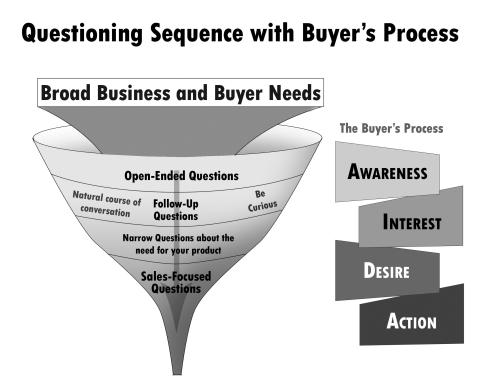Are your questions drawing your buyer closer to you or making your buyer back away from you? It may depend on the order in which you are asking questions. Adjusting the sequence of your questions can make a difference in how the buyer responds.
Early in a buyer/seller relationship, questions that seem sales-focused cause mistrust. A buyer recoils when questions seem to be some form of entrapment. By contrast, buyers open up and trust develops when a seller starts with buyer-focused questions.
Questions that inquire about how the buyer would use the seller’s product can easily and accidentally become overly focused on making the sale. Proceed with caution when asking these kinds of questions. The time for these questions is after the seller fully understands the buyer’s broader needs.
Sales-focused questions take many different forms. The best way for a seller to ascertain whether a question is buyer-focused or sales-focused is to check his or her own intention. Asking “will this question reveal buyer needs?” can help a seller be more discerning.
Questions about a buyer’s broad needs should precede questions about the buyer’s needs for the seller’s products.
Sellers should think of this progression as an inverted funnel. At the beginning are broad, open-ended questions focused exclusively on the buyer’s needs. As those needs become apparent, the funnel begins to narrow and the questions do, too. That’s when the seller shifts to questions which reveal how the buyer’s needs may be met by the seller’s product. Finally, at the very narrowest point of the funnel, as the seller is beginning to see a clear solution for the buyer’s needs, then (and only then!) the seller’s questions become focused on the sale.
 Another way of looking at this would be to overlay the question sequence funnel with the buyer’s process. The process of buying starts with gaining awareness and then developing an interest. Only a buyer who is aware and interested will desire a product and take action to acquire it. Broad questions focusing on the buyer’s need will open the buyer up to ideas the seller offers later because trust will develop and the seller will be differentiated. Interest grows when a buyer sees relevance and benefits. Sellers can only show relevance and benefits when they understand their buyers’ needs clearly.
Another way of looking at this would be to overlay the question sequence funnel with the buyer’s process. The process of buying starts with gaining awareness and then developing an interest. Only a buyer who is aware and interested will desire a product and take action to acquire it. Broad questions focusing on the buyer’s need will open the buyer up to ideas the seller offers later because trust will develop and the seller will be differentiated. Interest grows when a buyer sees relevance and benefits. Sellers can only show relevance and benefits when they understand their buyers’ needs clearly.
When sellers skip ahead to sales-focused questions, they are at risk of losing sales for two primary reasons. First, the sale is jeopardized when a seller offers a solution that isn’t quite right for the buyer. By making assumptions about buyer needs and skipping questions which would reveal more about those needs, the seller misses the mark.
Second, the sale is less likely to close when the buyer doesn’t feel connected to the seller or to the solution. The process of asking questions about buyer needs not only reveals the needs but also builds trust, creates value, differentiates the seller, and facilitates a connection between the buyer and the seller.
Keep the visual of a funnel in mind as you contrast the kinds of questions to be asked at the beginning, middle and end of a needs assessment. Here are examples of questions to illustrate sequencing in alignment with the buyer’s process.
Questions focused on a buyer’s broadest needs (at the top of the funnel) sound like:
- What goals have you set for the coming year?
- What is your top priority?
- Tell me about your expansion plans.
- What is the impact if these goals are not achieved?
- How does this year’s growth compare to last year’s?
Questions focused on a buyer’s narrower need for a seller’s product (lower in funnel) sound like:
- What is your current volume and who supplies you now?
- What gaps in supply have you been experiencing?
- How do you measure the ROI?
- By not making a switch, what will the impact be on sales?
- How does the ideal situation compare to the current situation?
Questions focused on the sale (end of the funnel) sound like:
- How soon are you thinking of making a supplier change?
- What criteria will you use to decide on a provider?
- What other options are you considering?
- What do you already know about our company?
This is the proper sequencing of questions for a seller who wants to understand buyer needs and advance the sale toward a proposed solution and, ultimately, to a close. To learn more about sequencing and crafting effective sales questions, pick up a copy of DISCOVER Questions™ Get You Connected, a finalist for Top Sales & Marketing Book of 2013.
 Written by Deb Calvert, President, People First Productivity Solutions-Author of the DISCOVER Questions book series, Deb has worked as a sales productivity specialist and sales researcher since 2000. She is certified as a Master Sales Coach, Master Trainer, and host of CONNECT! an online radio show for selling professionals where listeners ignite their selling power in just an hour. Deb helps companies to boost productivity through people development. This work includes leadership program design and facilitation, strategic planning with executive teams, team effectiveness work, and performance management program design.
Written by Deb Calvert, President, People First Productivity Solutions-Author of the DISCOVER Questions book series, Deb has worked as a sales productivity specialist and sales researcher since 2000. She is certified as a Master Sales Coach, Master Trainer, and host of CONNECT! an online radio show for selling professionals where listeners ignite their selling power in just an hour. Deb helps companies to boost productivity through people development. This work includes leadership program design and facilitation, strategic planning with executive teams, team effectiveness work, and performance management program design.
About ManagingAmericans.com
We are America’s Management & Leadership Center for Professional Development. Our well-rounded business content is designed for Leaders & Managers to implement change with ease & improve accountability amongst their teams. Here you’ll find Articles from 30+ Expert Consultants, Coaches & Thought Leaders, access practical Business Templates, learn new skills & connect to our Expert Panel to answer your organizational challenges.